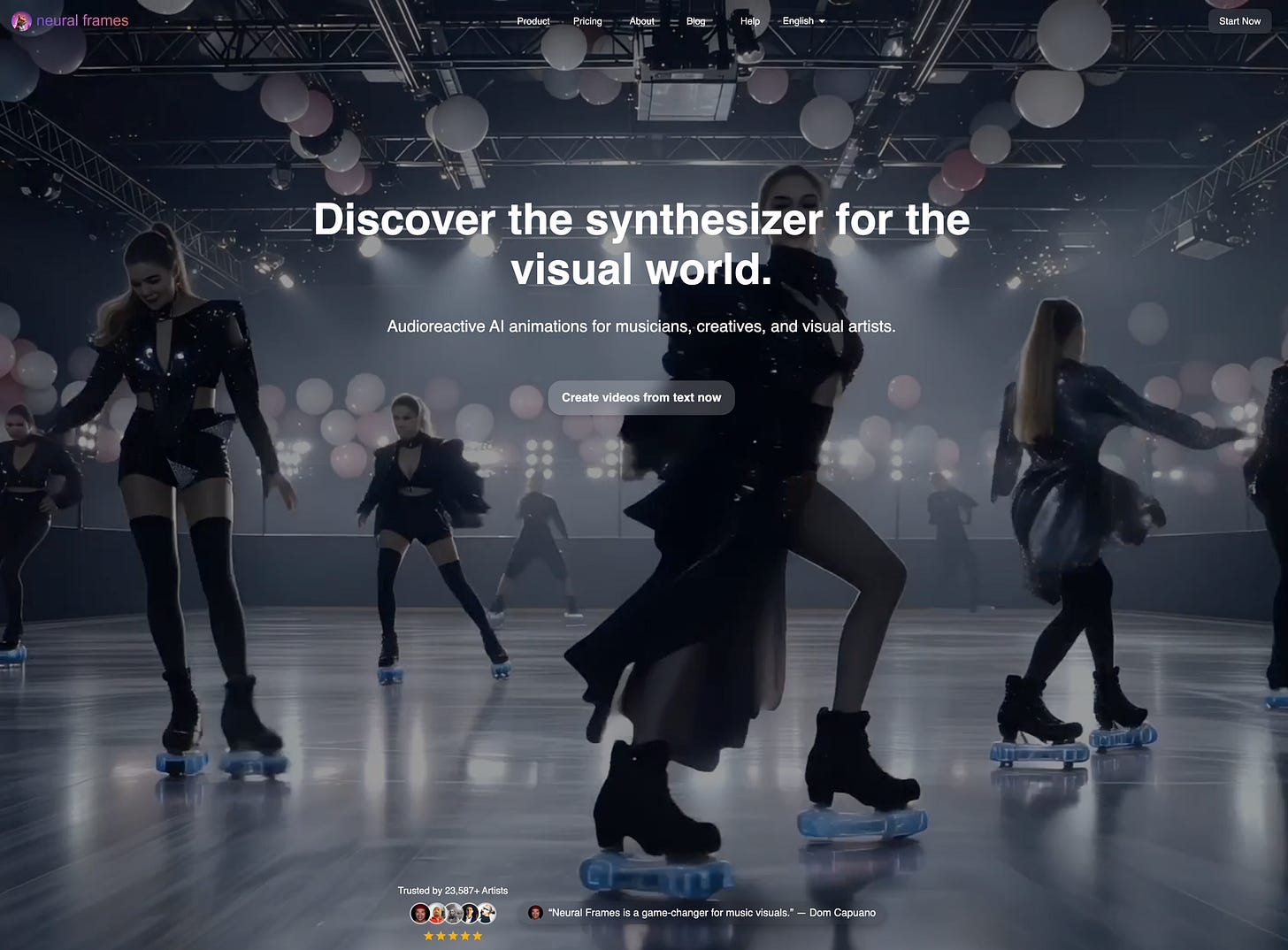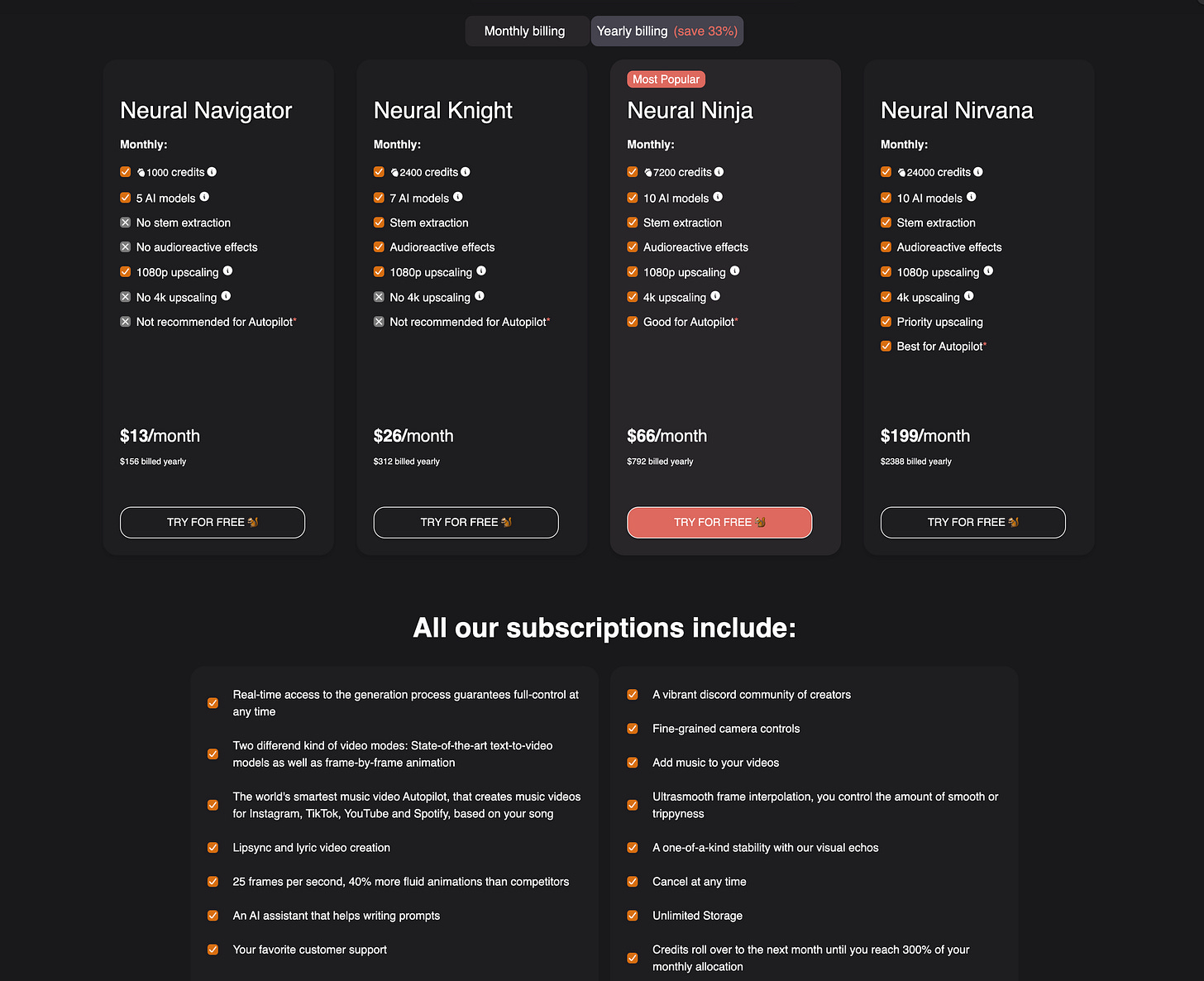From Laser Physics to Seven-Figure Revenue: Nicolai Klemke Builds Neural Frames into an AI Music Video Tool
"Happy Bootstrapping" Volume #33
Nicolai Klemke is a PhD physicist, passionate musician, and founder of Neural Frames – a platform that enables musicians and creatives to create AI-generated music videos.
In just three years, the 36-year-old from Berlin has grown his startup to a six-person team and a healthy seven-figure annual revenue. Completely bootstrapped, profitable, and with an impressive growth trajectory: revenue tripled last year.
How did he achieve this? A story about experimentation, community building, and the courage to follow a strong intuition.
This is a summary of Episode 145 of the “Happy Bootstrapping” Podcast (German).
From Stable Diffusion to Startup: The Founding Story
Nicolai’s path to Neural Frames was anything but straightforward. The computer nerd who built his first websites at age eleven consciously decided against computer science and studied physics in Berlin instead. After four years of PhD research in laser-optical physics, he made a brief foray into the startup world. At the end of 2022, he joined the “Entrepreneur First” accelerator – 50 people without ideas, brought together to found startups. Although nothing came of it, the program gave him crucial energy.
“I was still so full of this energy, like okay wow, what am I going to build now, what am I going to do?” Nicolai recalls. At exactly that moment, Stable Diffusion came out – an open-source text-to-image model. Nicolai started experimenting with creating animations and was immediately fascinated. “This felt like something really big to me,” he describes the moment when he realized: This could become a business.
Without a concrete vision, but with a strong belief that others would also appreciate this type of animation creation, he launched Neural Frames at the end of 2022. The first six months were tough – he had barely any frontend and cloud hosting experience. But then came the breakthrough: “After six months, the first really awesome music videos were created,” Nicolai recounts. That was the moment he knew: It works.
The Product and Business Model: From 5 to 100,000 Paying Customers
Neural Frames works remarkably simple: users upload a song, the platform analyzes lyrics and mood, suggests a storyboard – and the rest is customization. Users can change the visual style, upload their own characters, or even put themselves in the video. The finished music video can then be embedded on YouTube, Spotify, and other platforms.
The business model is based on credits: 100 to 500 credits monthly for $20 to $100. Videos cost between 200 and 4,000 credits depending on length. The math works out: Neural Frames currently generates six-figure monthly revenue and will achieve a healthy seven-figure annual revenue this year. From initially five paying customers, the platform has grown to over 100,000 paying customers – with a team of six people, four of them full-time.
Marketing: Community, SEO, and the Art of Organic Growth
The breakthrough came through Reddit. Nicolai posted his first AI music videos in various subreddits – and the reactions were overwhelming. “I posted my first content on Reddit and suddenly I had 200 users,” he remembers. The Stable Diffusion subreddit became the first major customer source.
But Nicolai was also strategic. In the first year, he invested heavily in SEO: “We wrote a gigantic guide about AI video generation. There’s an incredible amount of love in it.” The 30,000-word guide became an authority source in the AI video space and continues to drive organic traffic today.
YouTube became the second important channel. Nicolai himself produced over 400 tutorials – not because they brought massive views, but because they enabled users to create better videos. “You can make cooler stuff with the tool than I ever thought possible,” he says proudly about his users’ results.
Another game changer: influencers and creators. Nicolai gives selected musicians and creatives with large reach free credits. “They naturally bring us people,” he says pragmatically. Reddit no longer works like it used to – the platform has changed.
Technology: Own Models Instead of OpenAI
Neural Frames relies on open-source AI models and operates its own GPU infrastructure. “We host on cloud GPUs, mainly on RunPod,” Nicolai explains. The frontend uses TypeScript with React, the backend Python and FastAPI. The models are hosted locally – deliberately, because: “We don’t use OpenAI.”
This makes Neural Frames more independent and allows them to adapt models to their own requirements. The team structure is intentionally lean: three developers (Nicolai, another full-time developer, and a part-time developer), plus three people for support and community management.
Bootstrapping Challenges: Support Chaos and Scaling Pains
The biggest bootstrapping challenge? Support. “We currently receive 200 to 300 support requests per day,” Nicolai reports. The team is working hard to automate processes, but it remains a massive issue. A Head of Support has already been hired to help optimize the system.
The second challenge: hiring. “I have a really hard time finding people,” Nicolai admits. He’s looking for someone to take over growth – so far without success. He also considers finding a complete CEO replacement extremely difficult: “They have to understand everything somehow.”
Another challenge is the uncertainty in the AI market. “Will OpenAI make the same product? Will we be irrelevant in a year?” Nicolai wonders. The competition is huge – from Runway to Pika, from Luma to Kling. Nicolai relies on speed: “I’m not a big fan of planning. I’m a big fan of quickly trying things and seeing if they work.”
What I Learned from the Interview:
Community beats ads: Nicolai’s success is based on organic growth through Reddit, YouTube, and SEO – not paid advertising. Authentic content and genuine help build a loyal user base in the long term.
Niche over mass: Neural Frames consistently focuses on music videos – and it works. Instead of broadening, they’re going deeper into the niche.
Support is scalable: 200-300 requests per day with a six-person team show: Support can be a bottleneck. Automation and good processes are essential for profitable growth.
Learnings for Bootstrappers:
Follow your gut feeling: Nicolai started without a concrete vision, but with a strong feeling that AI videos could work. Sometimes that’s enough.
Invest in SEO early: The 30,000-word guide wasn’t a quick win, but it still drives organic traffic today. Long-term thinking pays off.
Content over perfection: 400 YouTube tutorials aren’t Hollywood production level – but they enable users to achieve better results. That’s more important than production value.
Community before scale: Nicolai gives selected influencers free credits. That’s cheaper and more effective than any ad campaign.
Hiring is the toughest nut: Even with six-figure monthly revenue, it’s extremely difficult to find the right people. Bootstrapping means: doing it yourself for a long time.
Quick experimentation beats planning: “I’m a big fan of quickly trying things and seeing if they work.” In fast-moving markets like AI, speed is more important than perfect planning.
Happy Bootstrapping is a German podcast where I interview bootstrapped founders, indie hackers, and solopreneurs about their startup journeys.
Over the years, I’ve connected with many successful entrepreneurs who have built e-commerce shops, SaaS platforms, mobile apps, content businesses, or hybrid models.
Furthermore I am a bootstrapper myself and growing my DevOps-as-a-Sercice and Web Operations Company “We Manage”.



